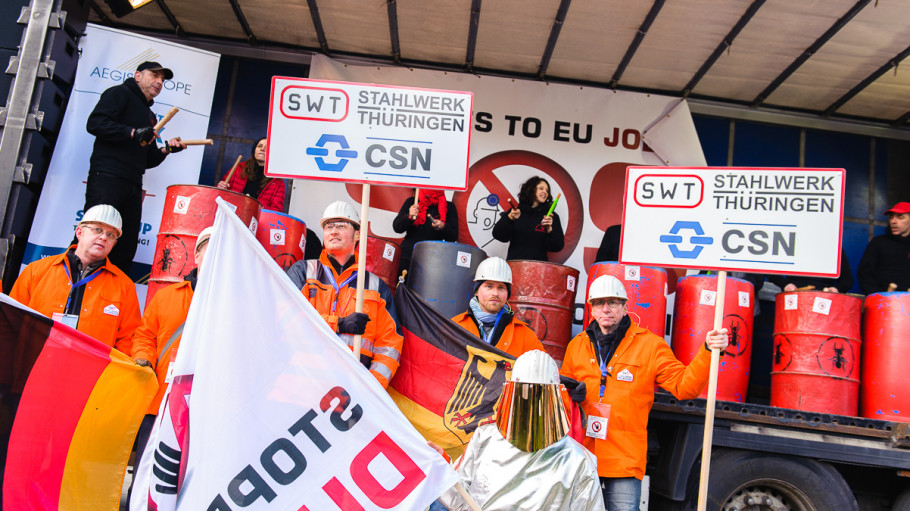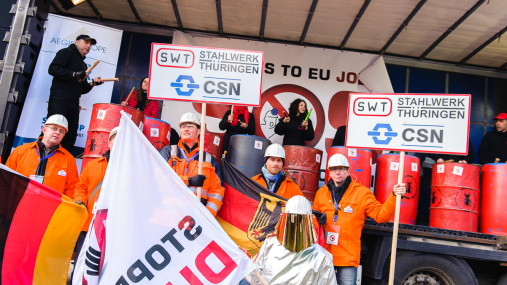
Press releases » European steel industry calls on policymakers to end steel crisis and to save hundreds of thousands of jobs
European steel industry calls on policymakers to end steel crisis and to save hundreds of thousands of jobs
Downloads and links
Recent updates

Brussels, 24 May 2019 – Against the backdrop of the ongoing EU elections the European Steel Association (EUROFER) calls for urgent action by EU policy makers to help the sector as it faces down the flood of steel exports deflected to the EU because of the US’ imposition of steel import tariffs in 2018. EUROFER also calls on EU policy makers to meet with them urgently to discuss how to end the crisis.
“There has been a sudden and markedly negative shift in the prospects of the European steel industry in recent months – and the terrible consequences are plain to see”, said Axel Eggert, Director General of EUROFER.
“We have seen announcements of actual or potential plant closures in several EU member states over the past few weeks. The bill of direct jobs immediately at risk exceeds 10,000. Given the EU steel industry’s multiplier effect, the loss of indirect employment in the supply chain could top 100,000”, added Mr Eggert.
Global overcapacity is the principle underlying factor of the present crisis – but the direct cause is the vast flood of exports targeting the EU market. Imports rose 12% to nearly 30 million tonnes in 2018 in the wake of the imposition of the US’ section 232 steel tariffs.
High and volatile raw material prices, slowing demand in downstream sectors, sharply higher carbon costs – five times higher than at the beginning of 2018 and borne by EU steel producers but not by imports of steel into the EU – and faltering EU economic performance have also increasingly squeezed the sector in recent months.
“While imports are an essential element in a competitive economic environment, it is the cause and rate of change that has undone the EU steel market. Imports have more than doubled since 2013”, added Mr Eggert, “EU steel demand has increased only marginally over the same period. We expect for there to be a decline in demand of 0.4% in 2019”.
“This is an acute crisis, reinforced by chronic underlying problems in the global steel market. European steel companies and their employees’ livelihoods are now actively threatened as a result. We need urgent action from policy makers to arrest what otherwise will become a precipitous decline”, emphasised Mr Eggert.
In 2018 the EU put in place a safeguard measure designed to guard against import surges. However, it has not worked as intended. To become effective, it needs to be revised, urgently, so that the market is not further distorted. EUROFER is seeking urgent consultations with the EU institutions and member state policy makers to remove the specific weaknesses in the current safeguard.
“EU policy makers can and must act now to revise the system in such a way that surges of imports are stamped out. An emergency meeting between the EU institutions and our sector is crucial to finding swift solutions to end this crisis before things gets worse than they already are”, concluded Mr Eggert.
Contact
Charles de Lusignan, Spokesperson and head of communications, +32 2 738 79 35, (charles@eurofer.be)
About the European Steel Association (EUROFER)
EUROFER AISBL is located in Brussels and was founded in 1976. It represents the entirety of steel production in the European Union. EUROFER members are steel companies and national steel federations throughout the EU. The major steel companies and national steel federations in Switzerland and Turkey are associate members.
About the European steel industry
The European steel industry is a world leader in innovation and environmental sustainability. It has a turnover of around €170 billion and directly employs 330,000 highly-skilled people, producing on average 160 million tonnes of steel per year. More than 500 steel production sites across 22 EU Member States provide direct and indirect employment to millions more European citizens. Closely integrated with Europe’s manufacturing and construction industries, steel is the backbone for development, growth and employment in Europe.
Steel is the most versatile industrial material in the world. The thousands of different grades and types of steel developed by the industry make the modern world possible. Steel is 100% recyclable and therefore is a fundamental part of the circular economy. As a basic engineering material, steel is also an essential factor in the development and deployment of innovative, CO2-mitigating technologies, improving resource efficiency and fostering sustainable development in Europe.

Download files or visit links related to this content
Brussels, 02 July 2025 – The 90% climate target proposed today by the European Commission demands an unprecedented transformation of EU society and industry in just 15 years. The European steel industry is already doing its part, but a viable business case for the transition is still lacking. To enable it, the EU needs to implement the Steel and Metals Action Plan much more decisively, delivering a highly effective trade protection against global overcapacity, access to internationally competitive low carbon energy and scrap, and a watertight CBAM, says the European Steel Association.
How global overcapacity is destroying European industries
European Steel in Figures 2025 is EUROFER's statistical handbook, laying out in an easy-to-use format the key statistics and data about the performance and footprint of one of Europe's most important strategic sectors